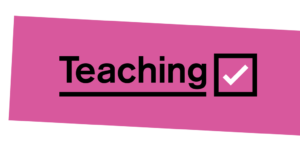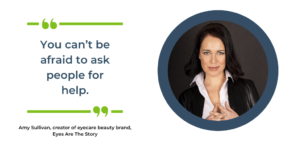Freelance Copywriter careers guide and job profile
Do you want to be your own boss? Are you creative, a skilled writer, and passionate about creating the kinds of content that reaches audiences and gets results? If so, becoming a freelance copywriter could be the career for you.
Getting into Freelance Copywriter careers
How much money can you earn as a Freelance Copywriter?
These LMI Job Trends give you a sneak peek of how much you could earn starting out for this career, and how much your salary could grow with experience.
Average salary for writing jobs
Recent labour market information says you can earn on average between £16,000 and £50,000 a year as a Freelance Copywriter in the UK.
Your starting salary can vary because of factors like level of experience, training, location or the size of the company. Your salary as a Freelance Copywriter will increase over time as you build skills, knowledge, and experience.
Creative Career FAQs & Insights

Is there something you’d like to know about creative careers?
Skills you need to become a Freelance Copywriter
Useful skills to put in your CV
- Great writing skills. It goes without saying but if you want to be a freelance copywriter, you will need to be an excellent writer with a great grasp of spelling, grammar, voice, tone, syntax, and writing to a brief.
- Communication and people skills. Though copywriting is often a solo endeavour, you will need to be an excellent communicator in order to get your or your clients’ ideas across effectively. You will also need to be able to communicate and collaborate effectively with clients.
- Research skills. You may be asked to write on a topic you know little about, and have to go away and research it to create the content. This might mean using print or digital resources (such as books, newspapers, and websites), sourcing expert interviews or quotes, and fact checking content before publishing.
- Empathy. To be a great copywriter, you will need to understand how people think, feel, and are moved to take action.
- A good understanding of business practices and marketing principles.
- An understanding of search engine optimisation (SEO).
- A good working understanding of content management systems (CMS) and the main social media platforms.
- Creativity, open-mindedness, and a curious outlook.
- Relevant industry knowledge if you decide to specialise in a particular niche (more on this later!)
- Self-motivation, time management, and the ability to juggle many different priorities. When you are your own boss, you are responsible for meeting deadlines and holding yourself accountable.
- Attention to detail.
Top Skills-boosting Tips
Write as much as you possibly can. What you write is less important than the fact that you are writing regularly. Try out a variety of styles and forms and get to know your unique voice. Learn how to read as a writer. When you engage with a piece of content, consider how it is constructed, what works well, and how the writing could be improved.
Consider setting up your own blog or website on a topic that interests you, too – this is a great way to improve your skills, build up a body of work you can show to potential clients, and start building an audience who are interested in what you have to say.
How Do You Get These Skills?
Vocational qualifications and work experience will help you build these skills over time.

Build Your Skills With the FREE Young Professional Programme
What Qualifications & Training Do You Need For Copywriting Careers?
School, college and training
You do not need any specific qualifications or training to become a freelance copywriter. Your writing skills are the most important thing. However, there are numerous different qualifications you can take to learn your craft, hone your skills, and make yourself attractive to prospective clients.
Apprenticeships
An apprenticeship is a scheme where you train while earning a starting salary. With an apprenticeship (or advanced apprenticeship) you’ll have a paid job with an employer that includes structured training and learning. This training leads to an official qualification that’s recognised by employers as an industry standard.
You can study an apprenticeship in Copywriting or Content Production, though only a relatively small number of organisations offer these. Related apprenticeships might include Digital Marketing or Social Media Marketing, which will include copywriting amongst other duties.
Anyone over 16 can study for an apprenticeship. You will normally need at least 5 GCSEs at grades 4-9 (A*-C) to study for an apprenticeship, including English and Maths.
A-Levels
A Levels are academic qualifications that come after GCSEs. A Levels can be an ideal stepping stone to an advanced apprenticeship, a degree, a job, or going straight into a freelance career. Some subjects you might want to consider include:
- English Literature
- English Language
- Media Studies
- Media, Journalism & Production
- Business Studies
- Psychology
- ICT
BTECs
As an alternative to A-Levels, you can do BTECs from the age of 16. There are a number of BTEC subjects you might want to consider if you are interested in becoming a freelance copywriter.
- Level 2 Certificate in Copywriting and Content for Marketing
- Level 2 Technical in Marketing
- Level 3 National in Marketing
- Level 3 UAL Extended Diploma in Creative Writing for Media
- Level 3 National Foundation Diploma in Digital Content Creation
- Level 5 Higher National Diploma in Business (Marketing)
You’ll normally need 2 or more GCSEs at grades 9-3 (A*-D) or equivalent for a Level 2 or 3 course. If your qualifications are lower than this, you’ll most likely start on a Level 1 course.
Short Courses
If you’d like to learn more about copywriting, there are countless short courses available to help you get started. Some of these are free, while others have a cost attached. Short courses can be expensive, so do your research and ensure you’re signing up for a reputable programme before you hand over any money. It is best to look for courses offered through reputable institutions such as universities and colleges, by professional bodies such as the Digital Marketing Institute, or from experienced professionals with a proven track-record in the industry.
Be very wary of high-cost courses that promise instant results, overnight success, or enormous financial returns, as these are usually scams.
University degrees and graduates
There is no specific requirement to go to university to become a freelance copywriter. However, the competition is fierce and your skills will need to be honed to a professional standard. Studying an appropriate course at university is one of the best ways to achieve this.
There are currently no specific degrees in copywriting, but Creative Writing degrees are now very common and offered through numerous universities throughout the UK. Other degree subjects you might want to consider include Journalism(*), Media Studies, Marketing, Digital Marketing, Communications, English Literature, and English Language.
(*) Copywriting and journalism are different jobs and industries, but many of the necessary skills translate from one to the other. Some freelancers create hybrid careers doing a mix of both.
If you already have a degree (whether in a related subject or something entirely different), a postgraduate qualification such as a Masters Degree can help you to enhance your skills and gain another relevant qualification that will help you to stand out from your competition.
You might want to consider a Masters Degree in a subject such as Creative Writing, Digital Marketing or Digital Media, Communications, or Media Studies.
T-Levels
T-Levels are a choice for learners after GCSEs alongside apprenticeships and A-levels.
T Levels, an alternative to A-Levels, are qualifications in vocational, technical and hands-on subjects that you can choose to do after GCSEs instead of traditional academic qualifications. They include a mixture of classroom-based learning and industry placements where you can put your new skills into practice in real-world scenarios.
A T Level in Media, Broadcast and Production will launch from 2024 and could be a good choice for a prospective copywriter.
Taylor & Francis Early Careers
You don’t need a degree to succeed with international publishing company Taylor & Francis. Benefit from career building workshops, early career opportunities, mentoring and more!
Career Progression
It may not be realistic to begin your career as a freelance copywriter. Most freelancers begin their careers in traditional employment and transition to freelancing later. This allows them to gain experience and skills, boost their CVs, build their networks, and create a portfolio of work to show to prospective clients, all while earning an income. If you are just starting out, consider looking for junior roles in marketing, digital media, or content creation. Many freelancers also come to copywriting via journalism.
As long as your job does not forbid it and there is no direct conflict of interest, you can freelance part-time in your own time while you work for an employer.
This is a great way to test the waters and grow your client base without the risk of plunging into freelancing full-time, and can pave the way for you to make the switch later.
Once you are established as a copywriter, there are many ways your career can progress. You might choose to focus on a specific industry or niche, establishing a reputation as a go-to writer in that space. You might look at attracting more prestigious or higher-paying clients, diversifying your client base, or expanding into different areas of content production. Some freelancers later set up businesses such as content agencies, employing a team of staff to serve more clients under one brand.
What Work Experience Do You Need For Copywriting Jobs?
Work Experience Tips
The most important thing for a would-be writer is to write. Write as often as you can, experiment with different genres and styles, and try to practise writing to a brief (a set of instructions.) Any work experience placement that gives you the opportunity to write would be a great opportunity. Consider looking for work experience with marketing, digital media, or content production teams (these exist across almost every industry!) Newsrooms or journalism placements are also great options for aspiring writers.
You can find placements or internships via your school or college, by researching openings and applying online, or even by approaching companies directly. Companies such as Bauer Media and Taylor & Francis offer great work experience and internship opportunities for anyone with an interest in media-related careers.
Examples of relevant work experience include:
- Work shadowing (even if it’s just for a day)
- Work placements in a company
- Work experience placements on a college or university course
Volunteering Tips
You can build your skills in your own time to enhance your CV, build your portfolio, and improve your writing to make your offer irresistible to prospective future clients. One of the best ways to do this is through voluntary work. Volunteering looks great on your CV, even if the experience is not directly related to the job you’re applying for, but relevant volunteering is even better.
Writing for free has a bad reputation, and deservedly so. Unfortunately, many unscrupulous companies are all too willing to take advantage of new, young, and hopeful writers looking for their break. Voluntary work is not the same as providing free work that you really should be paid for, and the rule of thumb is that you should never volunteer for a for-profit business or organisation.
Here are a few ideas of voluntary work you can look for that will help your freelance copywriting career:
- If you do any extracurricular activities (such as a drama group or sports team), offer to take on creating website content, marketing emails, social media posts, and so on.
- Offer your services to a favourite charity or community organisation. Smaller organisations tend to be best for this, as large national charities often have copywriters in-house.
- Volunteer to write for a free local paper, your school magazine, or a special-interest publication you love.
What Does A Freelance Copywriter Do?
A copywriter creates, writes, and edits all kinds of different written content. Website copy, articles, blog posts, social media content, email marketing copy, advertisements, taglines, press releases, and white papers are just some of the examples of the types of content a copywriter might work on. Their job is to use words to convey a message, achieve a goal, or get the reader to take action (such as buying a product, signing up for a service, or giving to a charity.)
When you are a freelance copywriter, this just means that you work for yourself rather than for a specific employer. Most freelancers have multiple clients (this can range from two up to dozens, depending on the type and frequency of work–but in general a few stable, regular clients is the ideal situation to aim for).
Being a freelancer means that you can set your own schedule, work as much or as little as is appropriate for you, and pick and choose the projects you’ll take on. You can also set your own rates. You might charge per word, per project, or per hour… or a combination of the above depending on the specifics. Some copywriters work in a specific niche or industry, while others prefer to keep their workload broad and varied. There are pros and cons to each approach, and there is no right or wrong answer–you must choose what works best for you.
Example daily job responsibilities:
- Come up with content ideas and pitch them to clients
- Write copy in a variety of forms
- Ensure that copy is optimised for search engines such as Google
- Edit copy provided by the client or another writer
- Edit your own copy according to client feedback
- Upload content to the web (for example, into a website consent management system or social media channel)
- Search for, contact, and pitch new clients
- Hold meetings with clients, either online (e.g. Zoom calls) or in person (e.g. site visits)
- Play a role in creating and refining content strategies for clients
Don’t forget that, on top of all this, you will also need to manage your own finances. This means sending invoices, keeping track of payments sent and received, recording your business expenses, and filing your own tax return at the end of the financial year (don’t forget to set aside enough money to pay your tax bill as freelancers do not benefit from Pay-as-you-Earn!)
How To Find Freelance Copywriting Jobs: Next Steps
Whether you are ready to take the plunge as a full-time or part-time freelancer, your next question might be “where can I find freelance copywriting clients?” There are lots of answers to this question and it is usually best to try at least a few different channels.
Don’t forget that geography need not necessarily be a barrier. When you are a freelance writer, you can–at least theoretically–serve clients anywhere in the world as long as you share a common language.
Here are just a few ways to get started and land your first client:
- Tap into your professional network (but if you are already employed or have recently left a job, be careful to avoid client poaching or conflicts of interest!)
- Ask your family, friends, and professional acquaintances to keep you in mind for any writing gigs they know of.
- If you have good relationships with any former employers or managers, approach them to let them know you have gone freelance in case they ever have need for your services.
- However, if you use your judgement and value yourself properly, you can find good opportunities through them.
- Sign up for freelance opportunities newsletters. We like Sonia Weiser’s Opportunities of the Week and Sian Meades Williams’ Freelance Writing Jobs.
- Use online marketplaces such as Freelancer or Fiverr. Be cautious here, as these sites can sometimes encourage undercutting on pricing to the point that rates are exploitatively low.
- Peruse jobs boards, social media, and LinkedIn.
- Consider working with a content agency. Agencies do not tend to pay as well as working with clients directly, as they will take a cut of whatever you make, but they can be a good way to get started, build your network, and create a professional portfolio.
- Pitch yourself directly to companies and organisations. Smaller and local businesses are often your best bet here, as larger companies may have copywriters already in-house.
You can also take a look at our database of local opportunities to see if there are any relevant jobs, work placements, or careers events and workshops to help you get started. Create Your Future!
Get Into Creative Careers With Youth-Friendly Employers
These employers and organisations are here to help. They care about your potential and desire to learn, not just your qualifications and experience. They may be able to offer traineeships, apprenticeships, graduate schemes, first jobs, careers advice, wellbeing support and much more.
Creative Career Tips & Opportunities
Creative and Design Career Guides
View job descriptions with average UK salary, useful qualifications and a variety of routes into this career.
See All Our Youth-Friendly Employers

























YES! I Want More Free Careers Help...
So what are you waiting for? Grab your future.






























